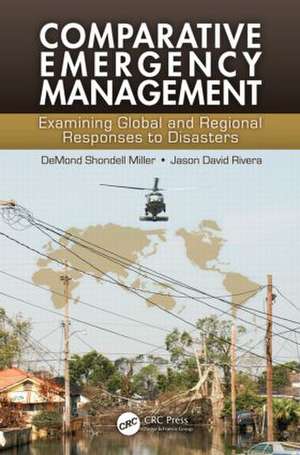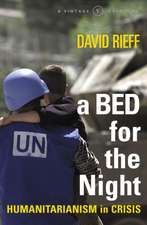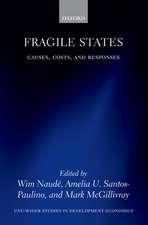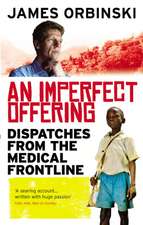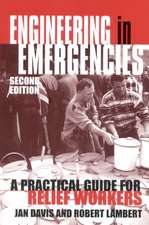Comparative Emergency Management: Examining Global and Regional Responses to Disasters
Editat de DeMond Shondell Miller, Jason David Riveraen Limba Engleză Hardback – 16 iun 2011
Explores issues on all continents
With discrete sections on the Americas, Africa and the Middle East, Europe, Asia, and the Pacific Rim, the book presents the work of researchers and practitioners who examine ways different societies have responded to environmental threats using innovative methods to cope with their vulnerabilities to disaster. Topics discussed include:
- A game approach that has been used as an effective tool in the communication of disaster risk information in the Caribbean
- Efforts to rebuild tourism in New Orleans despite the challenges presented by media coverage of Hurricane Katrina
- Faith-based organization (FBO) humanitarian assistance in the Muslim world
- Nongovernmental and community-based responses to the Asian tsunami and the Sumatran earthquake
Preț: 1626.06 lei
Preț vechi: 2032.58 lei
-20% Nou
Puncte Express: 2439
Preț estimativ în valută:
311.15€ • 320.100$ • 259.65£
311.15€ • 320.100$ • 259.65£
Carte tipărită la comandă
Livrare economică 26 martie-09 aprilie
Preluare comenzi: 021 569.72.76
Specificații
ISBN-13: 9781439804919
ISBN-10: 1439804915
Pagini: 470
Ilustrații: 52 b/w images and 25 tables
Dimensiuni: 156 x 234 x 30 mm
Greutate: 0.77 kg
Ediția:1
Editura: Taylor & Francis
Colecția CRC Press
Locul publicării:Oxford, United Kingdom
ISBN-10: 1439804915
Pagini: 470
Ilustrații: 52 b/w images and 25 tables
Dimensiuni: 156 x 234 x 30 mm
Greutate: 0.77 kg
Ediția:1
Editura: Taylor & Francis
Colecția CRC Press
Locul publicării:Oxford, United Kingdom
Public țintă
Public and private aid nongovernmental organizations (NGOs) and agencies, public policy makers, and government officials involved in emergency planning, operations, and response.Cuprins
Introduction: Tragedy Has Brought Us Together: The Role of Partnerships in Responding to Regional Catastrophes. Section I: The Americas . Section II: Africa and the Middle East. Section III: Europe and Asia Section IV: Southeast Asia and the Pacific Realm. Conclusion.
Notă biografică
DeMond Shondell Miller is a professor of sociology and director of the Liberal Arts and Sciences Institute for Research and Community Service at Rowan University (Glassboro, New Jersey). He has worked as principal investigator to facilitate research projects involving natural and technological disasters, environmental issues, and community satisfaction. His primary area of specialization is environmental sociology (disaster studies and the study of the social construction of place), community development and community organizing, and social impact assessment. He is currently engaged in research on international environmental policy, coastal and maritime sustainable tourism, and the ongoing social impacts of Hurricane Katrina and the Deepwater Horizon Oil Spill.
Jason David Rivera is a research associate in the William J. Hughes Center for Public Policy at The Richard Stockton College of New Jersey. His research focuses on social vulnerability to natural and manmade disasters with an emphasis on minority experiences. Additionally, his research highlights institutional structures that have historically perpetuated social vulnerability within minority and low income communities. These research findings have been incorporated into policy recommendations that make mitigation, response, and recovery more efficient.
Jason David Rivera is a research associate in the William J. Hughes Center for Public Policy at The Richard Stockton College of New Jersey. His research focuses on social vulnerability to natural and manmade disasters with an emphasis on minority experiences. Additionally, his research highlights institutional structures that have historically perpetuated social vulnerability within minority and low income communities. These research findings have been incorporated into policy recommendations that make mitigation, response, and recovery more efficient.
Descriere
Bringing together the contributions of international experts, this book demonstrates ways to recognize and reduce regional infrastructure vulnerability by building secure networks of collaboration within different areas of the world. With sections on the Americas, Africa and the Middle East, Europe, Asia, and the Pacific Rim, it examines the various ways different societies have responded to environmental threats. The book presents a multifaceted study to foster dialogue among policymakers to reduce social vulnerability and build local and regional capacities to withstand environmental assaults.
